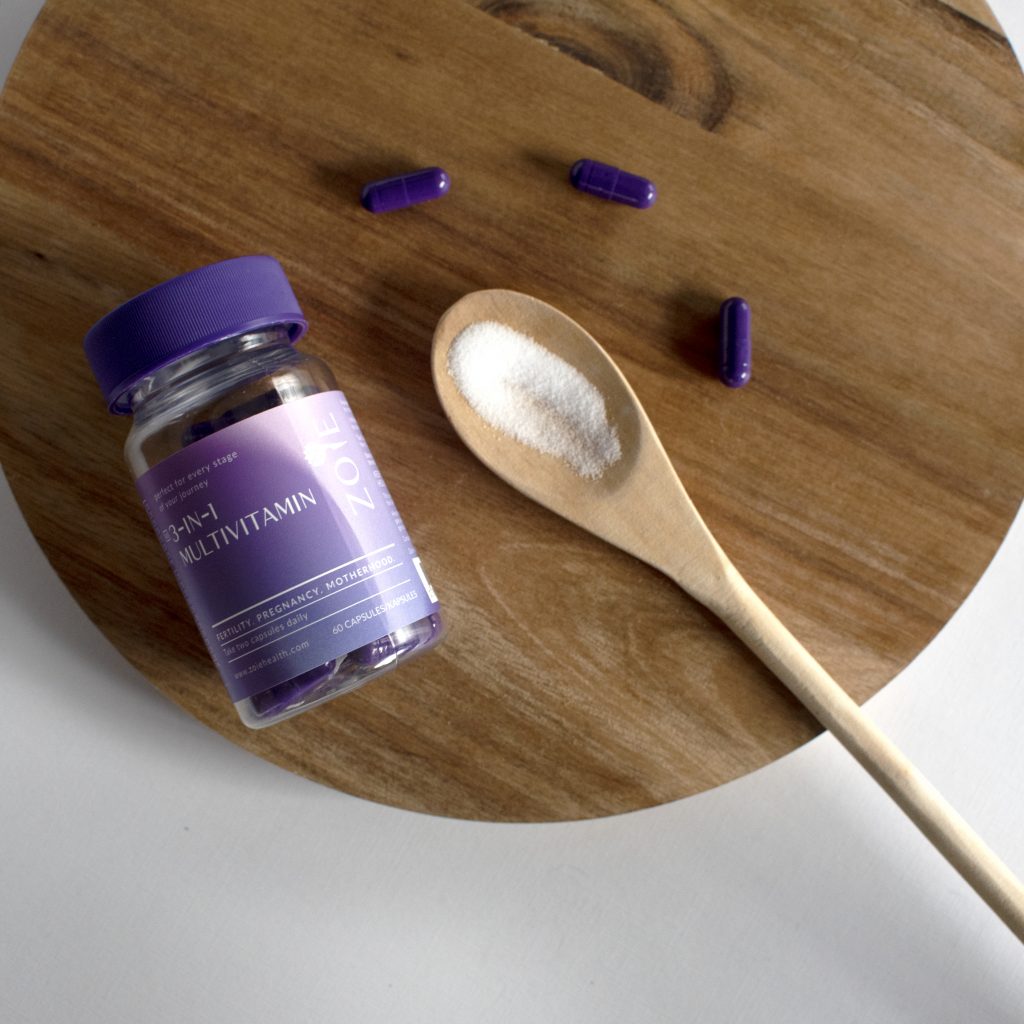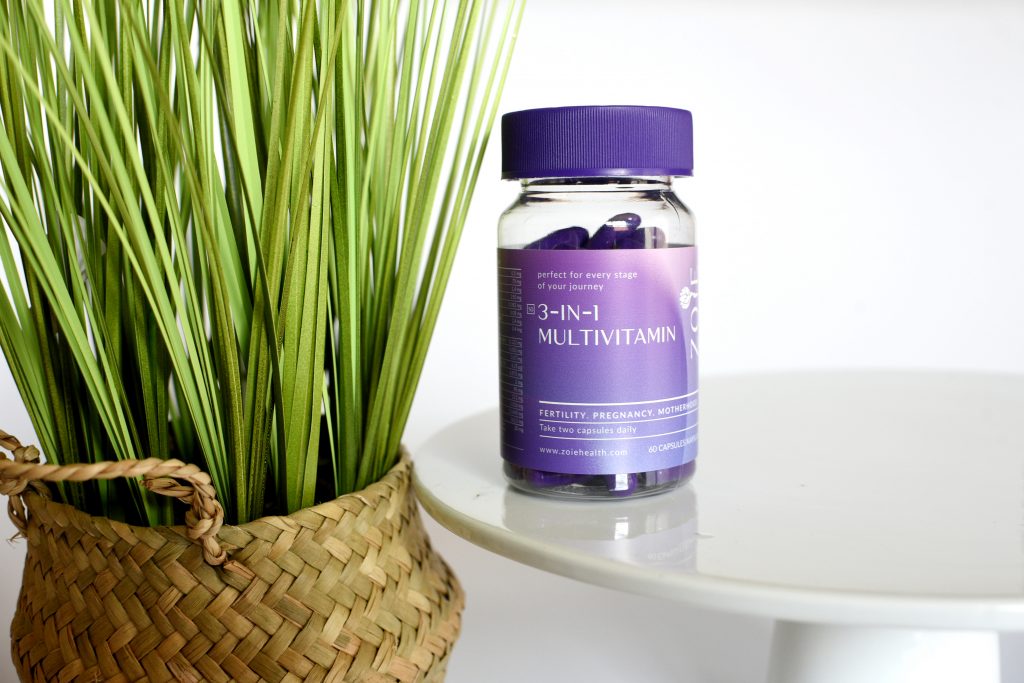Safe Pain Relief During Pregnancy: What You Need to Know About Taking Painkillers While Pregnant

Zoie Health’s resident GP, Dr Caitlin Parker tells us all we need to know about taking painkillers during pregnancy. Pregnancy can be a rollercoaster of experiences, and one common issue many expectant moms face is figuring out how to safely manage pain and discomfort. It’s natural to want to make sure that any medicine taken during this special time is both effective and safe for your baby. One challenge with medications during pregnancy is the lack of extensive research. Testing drugs on pregnant or breastfeeding women is rare due to the possible risks involved. So, doctors often need to carefully consider the potential benefits of a medicine against any risks it might carry. Now, let’s explore the options for pain relief during pregnancy. Paracetamol: A Preferred Choice Paracetamol is often the first choice for pain relief during pregnancy. It works by calming pain signals in the body and brain. It’s great for common pains like headaches or muscle aches and is available in many forms, including tablets, liquid, and even fizzy tablets. It’s important to use paracetamol as directed, especially if you have liver issues. Also, taking too much can be harmful. NSAIDs: Use With Caution During Pregnancy NSAIDs, which include common drugs like ibuprofen and naproxen, help reduce pain by controlling inflammation. However, these drugs can affect important processes in foetal development, especially regarding certain blood vessels in the baby. This means they might be risky, particularly in the later stages of pregnancy. Generally, it’s best to avoid NSAIDs while pregnant, unless your doctor advises otherwise for specific reasons. Aspirin and Opioids: Think Carefully Aspirin is another pain reliever that falls into the NSAID category. Sometimes, in low doses and for certain conditions, doctors might prescribe it during pregnancy. But, like NSAIDs, it’s better to use it only if your doctor recommends it. Opioids are strong pain relievers but come with significant risks, like addiction and serious side effects. They are usually a last resort for severe pain during pregnancy and should always be used under a doctor’s supervision. The risks associated with opioids are higher in the later stages of pregnancy. Combination Painkillers: Be Mindful Many over-the-counter painkillers combine different types of pain relief in one pill. While this can be more convenient, it’s crucial to understand what’s in these combination drugs to avoid accidentally taking too much, especially if you’re also taking other medicines like cold or flu remedies. Alternatives to Medicine Besides medication, practices like breathing exercises and mindfulness can also help manage pain and stress during pregnancy in a safe way. In Summary Paracetamol is generally the safest option for pain relief during pregnancy and breastfeeding. But it’s always best to talk to your healthcare provider before taking any medicine. They can help you choose the safest and most effective options for your particular stage of pregnancy and health needs. Remember, we at Zoie are here to support you throughout your pregnancy. If you’re in pain and home remedies aren’t helping, or if you have any worries, please get in touch with us for personalized advice. Medical Disclaimer: This article is for informational purposes only and does not constitute medical advice. The information provided herein, including but not limited to, text, graphics, images, and other material, is general in nature and is not intended to be a substitute for professional medical advice, diagnosis, or treatment. Always seek the advice of your physician or other qualified health provider with any questions you may have regarding a medical condition. For any questions, queries or concerns, please contact Dr Caitlin at support@zoiehealth.com Sources: Dr Caitlin Parker.
Zoie Health 3-in-1 Multivitamin: An Ultimate Guide

Whether you’re envisioning parenthood, expecting, or basking in the joys of new motherhood, your well-being matters. Enter our 3-in-1 Multivitamin, a Fertility, Pregnancy, and New Motherhood Supplement, now infused with the natural African ingredient moringa. Crafted by healthcare experts, this multivitamin is designed to accompany you through the phases of motherhood, from fertility to postpartum. Moringa, a nutritional gem, joins essential nutrients like folic acid, omega-3, and iron, providing holistic support. But we’re more than a supplement – with every purchase, you gain access to the Zoie Health community. Moringa and experts join forces to empower your journey. And here’s the best part: it’s yours for the special launch price of R249, valued at R349. We’ve collected all of the questions we have been asked, and provided easy to understand answers all in one place. Q1: Is the Zoie Health 3-in-1 Multivitamin safe for use during pregnancy? A: Yes, our Zoie Health 3-in-1 Multivitamin is designed with the specific needs of expectant mothers in mind. It includes essential nutrients like folic acid, iron, and omega-3 fatty acids that are important for the health of both you and your baby during pregnancy. However, it’s always a good idea to consult with your healthcare provider before starting any new supplement regimen, especially during pregnancy. Q2: Can I take the Zoie Health 3-in-1 Multivitamin while breastfeeding? A: Absolutely! The nutrients in our Zoie Health 3-in-1 Multivitamin are beneficial for both you and your nursing baby. Nutrients like omega-3 fatty acids and choline can support your baby’s brain development, while other vitamins and minerals aid in your postpartum recovery. As with any supplement, it’s best to consult your healthcare provider before starting, especially if you have any specific health concerns. Q3: What sets the Zoie Health 3-in-1 Multivitamin apart from others on the market? A: Our Zoie Health 3-in-1 Multivitamin stands out for several reasons. First, it is developed by a team of healthcare experts, including gynaecologists, pharmacists, and dieticians, who understand the unique needs of women during different stages of motherhood. Second, our supplement is not just about nutrition – with every purchase, you gain free access to the Zoie Health community, connecting you with a team of health experts to guide you through your journey. Lastly, our commitment to giving back means that a portion of your purchase goes towards supporting important women’s causes. Q4: Can I take the Zoie Health 3-in-1 Multivitamin if I’m trying to conceive but not yet pregnant? A: Absolutely! In fact, our Zoie Health 3-in-1 Multivitamin is designed to support you during the preconception phase as well. Nutrients like folic acid and choline are important for healthy conception and early fetal development. By providing your body with the right nutrients during this crucial time, you’re giving yourself the best possible start on your motherhood journey. Q5: How long should I take the Zoie Health 3-in-1 Multivitamin for? A: The duration of supplement use can vary based on individual needs and circumstances. For those trying to conceive, it’s a good idea to start taking the supplement a few months before actively trying. During pregnancy, you can continue taking it under the guidance of your healthcare provider. Postpartum, you may choose to continue taking the Zoie Health 3-in-1 Multivitamin if it complements your nutritional needs. Remember, our team of experts is here to provide guidance at every step. Q6: Are there any allergens in the Zoie Health 3-in-1 Multivitamin? A: Our Zoie Health 3-in-1 Multivitamin is formulated to be free from common allergens such as gluten, dairy, and soy. However, it’s important to read the product label and ingredient list to ensure it is suitable for your specific dietary needs. Q7: What’s the recommended dosage of the Zoie Health 3-in-1 Multivitamin? A: The recommended dosage of our Zoie Health 3-in-1 Multivitamin is usually two capsules per day. However, individual needs can vary, so it’s a good idea to follow the dosage instructions on the product label or as advised by your healthcare provider. Taking the supplement consistently at the same time each day can help you establish a routine and make the most of its benefits. Q8: Can I take the Zoie Health 3-in-1 Multivitamin with other medications I’m currently on? A: If you’re currently taking any medications, it’s important to consult with your healthcare provider before starting any new supplement, including ours. Certain nutrients can interact with medications, and your healthcare provider can provide personalized guidance on how to incorporate the supplement safely into your regimen. Your health and well-being are our priority. You can book a consult with one of our Zoie doctors to get further advice. Q9: Is the Zoie Health 3-in-1 Multivitamin only for first-time mothers, or can it benefit those who have had multiple children? A: Our Zoie Health 3-in-1 Multivitamin is beneficial for women at all stages of their motherhood journey, regardless of whether they are first-time mothers or have had multiple children. The targeted nutrients in the supplement can support fertility, pregnancy, and postpartum recovery, making it suitable for a variety of situations. Every pregnancy and motherhood experience is unique, and our supplement is here to provide essential support no matter where you are on your journey.\ Remember, our customer support team is here to address any additional questions you may have about our Zoie Health 3-in-1 Multivitamin. Your journey is important to us, and we’re here to provide the information and support you need to make the best choices for your health and well-being. Embrace wellness, impact lives. Choose our Zoie Health 3-in-1 Multivitamin enriched with moringa. Click now to elevate your journey. (Note: Always consult with your healthcare provider before starting any new supplement regimen.)
Empowering Your Motherhood Journey with Our 3-in-1 Fertility, Pregnancy, and New Motherhood Multivitamin, Enriched with Moringa

Are you dreaming of starting a family, currently expecting a little one, or already embracing the joys of new motherhood? No matter which stage of your motherhood journey you find yourself in, the right nutrition can make a world of difference. That’s where our revolutionary 3-in-1 Fertility, Pregnancy, and New Motherhood Multivitamin, enriched with the natural African ingredient moringa comes in. Crafted by leading healthcare experts, this powerful blend of essential nutrients is designed to support you throughout every step of your womanhood. Understanding the Importance of Proper Nutrition As women, our bodies go through incredible changes during different stages of life. From conception to pregnancy and postpartum, these transitions demand specific nutrients to support optimal health. Proper nutrition is not only vital for our well-being but also plays a crucial role in the development and well-being of our little ones. During the preconception phase, the right nutrients can enhance fertility, boost reproductive health, and prepare your body for a successful pregnancy. Throughout pregnancy, your nutrient needs increase to accommodate the growth and development of your baby. And after giving birth, the demands on your body continue as you nourish your newborn through breastfeeding. The Power of Our 3-in-1 Fertility, Pregnancy, and New Motherhood Multivitamin, Infused with Moringa Our 3-in-1 Multivitamin, now enriched with the natural African ingredient moringa, is the result of meticulous research and collaboration between gynaecologists, pharmacists, and dieticians. They have expertly curated a blend of essential nutrients tailored for each stage of your motherhood journey. Let’s explore some of the key ingredients and their benefits, including the remarkable properties of moringa: 1. Folic Acid (Vitamin B9): Vital during the preconception and early pregnancy stages, folic acid is essential for the development of the baby’s neural tube, which forms the brain and spinal cord. 2. Omega-3 Fatty Acids: These nourishing fats are crucial for brain development and cognitive function in both the foetus and the growing child. They also support the mother’s cardiovascular health. 3. Iron: During pregnancy, your body requires more iron to support increased blood volume and the growing baby. Iron deficiency can lead to anaemia, which may negatively impact both mother and baby. 4. Vitamin D3: Plays a critical role in the development of the baby’s bones and teeth. Additionally, vitamin D is essential for the mother’s immune system and overall well-being. 5. Choline: An essential nutrient that supports brain health and may help prevent neural tube defects during early pregnancy. 6. Magnesium: Helps alleviate muscle cramps and supports proper nerve function. It’s particularly important during pregnancy, as magnesium needs increase to aid in muscle relaxation. The Marvel of Moringa In addition to these vital nutrients, our multivitamin proudly incorporates moringa, a natural African ingredient known for its extraordinary health properties. Moringa is a nutritional powerhouse, rich in antioxidants, vitamins, and minerals. It’s known to support energy levels, enhance immunity, and promote overall well-being. With moringa as part of our formula, you’re not just nourishing your body, but also connecting with the remarkable benefits of this African treasure. More Than Just a Supplement At Zoie Health, we believe that your well-being extends beyond nutrition. As part of our commitment to supporting you through your motherhood journey, we are excited to offer something extra special – free access to the Zoie Health community. The Zoie Health community is a vibrant and supportive space where you can connect with a team of health experts, including gynaecologists, nutritionists, and lactation consultants, who are ready to provide personalised support and guidance throughout your womanhood journey. We understand that navigating motherhood can be overwhelming at times, but with the Zoie Health community by your side, you can access reliable information, share experiences with other mothers, and find comfort and support during every step of your journey. More from Zoie Health In addition to our 3-in-1 Fertility, Pregnancy, and New Motherhood Multivitamin enriched with moringa, Zoie Health offers an array of services and products tailored to meet the unique needs of women: 1. Prenatal Nutrition Plans: Our certified nutritionists have designed comprehensive prenatal nutrition plans to support you during pregnancy, ensuring you and your baby receive the necessary nutrients for a healthy journey. 2. Postpartum Support: The postpartum period can be challenging, but with our postpartum support services, you’ll receive expert guidance and care to ease the transition into motherhood. 3. Lactation Consulting: Breastfeeding is a beautiful and essential part of motherhood. Our lactation consultants are available to address any breastfeeding concerns or questions you may have, ensuring a successful breastfeeding journey for you and your baby. Making a Difference Together At our core, we believe that every woman deserves access to proper nutrition and support during her motherhood journey. That’s why, with each purchase of our 3-in-1 Multivitamin enriched with moringa, we pledge to donate a portion of the proceeds to women’s NGOs that advocate for gender-based violence survivors, human trafficking survivors, and provide access to menstruation products for underprivileged girls. When you choose our supplement, you’re not only investing in your own well-being but also contributing to the betterment of other women’s lives. Together, we can make a positive impact and empower women to thrive in all aspects of their lives. Conclusion Motherhood is a transformative journey, and the right nutrition and support are essential for a smooth and healthy ride. Our 3-in-1 Fertility, Pregnancy, and New Motherhood Multivitamin, enriched with the natural African ingredient moringa is your go-to companion, packed with essential nutrients to nourish you from preconception through to postpartum. And with free access to the Zoie Health community, you’ll have a team of experts guiding you every step of the way. Choose our supplement today and experience the difference it can make in your motherhood journey. Join us in our mission to empower women, support important causes, and foster a community of strong and resilient mothers. (Note: As with any new supplement regimen, it’s important to consult with your healthcare provider before starting, particularly during pregnancy or when planning to conceive.)
Fertility 101: How Crunches and Carrots can help with Fertility

Hey there, future mommies and daddies! Today, we’re diving into the fascinating world of fertility and how two rockstars, exercise, and nutrition, can get you on the baby-making train! So buckle up, it’s gonna be a fun and informative ride! Sweat It Out With Exercise Exercise isn’t just about looking fabulous in those skinny jeans; it’s a fertility booster too. A little moderate physical activity can do wonders for your hormone balance, stress levels, and blood circulation, all of which play a crucial role in your reproductive health. When you engage in exercise, your body releases endorphins, which help improve your mood and reduce stress. Additionally, exercise improves blood circulation, ensuring that vital nutrients are efficiently delivered to the reproductive organs, enhancing their function. Nutrition, Your Fertility BFF Picture this: a plate filled with colorful veggies, some delicious flaxseeds, and a side of walnuts – that’s the dream team for fertility. These nutritional superheroes, like folate, omega-3 fatty acids, and antioxidants, support your eggs and sperm, giving them all the protection they need from oxidative stress. Plus, maintaining iron levels will keep your menstrual cycle in check, so say hello to spinach and lean meats! Low on folic acid and iron? You can shop for them on Zoie here and here. Plus, if you need a dietician, Zoie has plenty onboard. You can book a consultation here. Getting to That Sweet Spot Weight Your weight can play a role in this baby-making game. Being underweight or carrying extra pounds can throw a wrench in your fertility plans. So let’s find that sweet spot where your hormones are doing the happy dance. A combo of exercise and a balanced diet will get you there, no sweat (well, maybe a little). Not sure where to get started? Chat to a wellness coach here. Chill and Reduce Stress Life can be stressful enough without worrying about making babies, right? Stress messes with your hormones. When your body experiences chronic stress, it produces high levels of cortisol, which can disrupt the delicate hormonal interplay required for successful ovulation and implantation. So, find your Zen zone with exercises like yoga and meditation. Trash the Bad Guys: Alcohol, Tobacco, and Friends Now, don’t get us wrong, we love a good party, but not when it messes with your fertility mojo. Those pesky substances like alcohol, tobacco, and recreational drugs can mess up your baby-making plans. Reducing intake of these substances can go a long way in improving your fertility.! Seeking Pro Help: The Dream Team! If you’ve been playing the baby-making game for a while without success, it’s time to call in the pros. Fertility specialists are like the secret weapon to tackle any obstacles. They’ll give you personalized advice and sort out anything that’s holding you back. So, don’t be shy; give them a ring. We’ve got plenty on speed dial at Zoie. Book a session here. Exercise and nutrition are the dynamic duo when it comes to boosting fertility. They’ll keep your hormones in check, your stress at bay, and your body in baby-making mode. Remember, every journey is unique, and what works for one may not for another. So, find your own rhythm, take care of yourself, and enjoy the ride. With exercise, nutrition, and a sprinkle of professional help if needed, you’ll be ready to welcome that little bundle of joy into your life soon. 😉 Sources: BioMedCentral, National Center for Biotechnology Information
Common pregnancy symptoms & how to deal with them

During pregnancy, your body goes through many changes and while each pregnancy is unique, there are some common pregnancy symptoms that many mothers-to-be experience. We’ve created a list of some of the most common pregnancy symptoms along with how you can manage them while being safe for you and your baby. Nausea & morning sickness This is probably the most well-known symptom associated with being pregnant. Feeling nauseous or throwing up is likely linked to the hormonal changes happening in your body. A few ways to deal with this common pregnancy symptom are: Read more: 10 best foods for pregnancy for health babies Tiredness & fatigue Growing an entire human being can be draining on your body, leading to you feeling exhausted. Be sure to prioritize rest by taking short naps can help with sleepiness during the day and aiming to get 8+ hours of sleep at night. Making sure you stay hydrated, eating nutritious foods and getting more frequent, low intensity exercise can help to minimize the feeling of fatigue. Shop now: Zoie Health’s pregnancy accessories Emotional changes & mood swings Many expecting mothers say that intense changes to their mood are a common pregnancy symptom. With the large increase in hormones in the body, many pregnant women experience mood swings that are uncharacteristic for them. To help regulate your hormones, try incorporating activities that will help reduce stress like meditation or low-intensity exercise. Talking to your friends and family can also help you to feel emotionally supported. Shop now: Zoie Health pregnancy supplements If you are pregnant and have any concerns about these common pregnancy symptoms or anything else that you are experiencing, speaking to a healthcare professional will be the best way to get the right kind of care and treatment for your unique pregnancy. To book a virtual appointment with a Zoie Health professional today, click here. Sources: American Pregnancy Association
Is this normal? Period FAQs and their answers

Just like women, periods aren’t one-size-fits-all yet there are many period FAQs that we may not want to ask out loud. Even when we do, we may not get the best answers and can feel even more confused than before. When women better understand their periods and what’s going on with their cycle, they can feel empowered by that knowledge and know how they can seek out the help they need when they need it. Speak to a qualified healthcare provider about all you period FAQs so you can get the best treatment for you. Here’s our list of period FAQs and the answers every woman should know about: How do I know if my menstrual cycle is a normal length? A menstrual cycle typically lasts between 21 to 35 days, with an average cycle length of 28 days. One cycle is usually counted as the number of days between the start of your period until the start of your next period. In order to find out how long your period is and to see if your cycle is regular, tracking your menstrual cycle is important. Start by marking the first day of your period on a calendar and the first day of your next period. Then count the number of days between these two dates to determine your cycle length. Do this over several months and see how many days each cycle is and if it’s consistent. Many women are now using period tracking apps in order to keep track of your menstrual cycle and to see when they are becoming irregular. Monitoring your cycle is a great tool for understanding your reproductive health and knowing when something could be wrong. What are normal PMS symptoms and how can I manage them? Premenstrual syndrome (commonly known as PMS) is a group of physical and emotional symptoms that happen in the days leading up to your period. Symptoms of PMS usually include: Eating more nutritious foods, getting regular exercise, and using stress management techniques like meditation can help to alleviate these symptoms. If you are experiencing more severe symptoms, you can talk to your healthcare provider about this period FAQ and what type of medication they would recommend to manage your symptoms. Read more: PMDD: What is it exactly? Why do I experience cramps during my period? Menstrual cramps are caused when the muscles around uterus begin contracting in order to shed its lining, leading to you having a period. The uterus does the same thing during childbirth, to help deliver the baby as well as the placenta. This is a normal symptom that many women experience during their period and while they can be uncomfortable, they should not be extremely painful to the point that you cannot do daily activities. My menstrual cramps are painful, how can I manage them? Dysmenorrhea is a medical name used to describe painful menstrual cramps. If you are having painful cramps during your cycle, taking over-the-counter painkillers, such as ibuprofen or paracetamol, can help to lessen the pain. Other options include applying heat to the lower abdomen where you can feel the cramps as well as getting regular exercise. Both of these options can help to alleviate the pain caused by cramping. Shop now: Zoie Health Period Care products Should I be concerned if my period blood is a different colour than usual? Period blood can range in colour from bright red to dark brown. This usually depends on the age of the blood and how long it’s been in your body for. A brighter shade is usually fresh blood while darker tones indicate that the blood is older. However, if your period blood is an unusual colour and/or has a foul smell, it may be a sign of an infection or another medical condition. If this happens, contact your healthcare provider to find out what treatment you need. Can period blood be a different texture or consistency? Yes, period blood can vary in both texture and consistency. Sometimes it may be thick and clumpy or thin and watery. Just like with a significant change to colour, if you experience significant changes in the texture or consistency of your period blood, speak with your healthcare provider about this period FAQ to find out what may be the cause of these changes and how you can treat any underlying conditions. When should I be concerned about heavy bleeding during my period? Heavy or prolonged bleeding during your period is known as menorrhagia. You may have menorrhagia if you need to change your tampon or pad very frequently or if you are passing blood clots larger than a R2 coin. If you experience heavy bleeding during your period, it may be linked to an underlying medical condition such as fibroids or endometriosis. Heavy menstrual bleeding can also affect the iron levels in your blood and can cause anemia. This is a condition when there is a shortage of red blood cells in the body. Symptoms of anemia include: If you have heavy periods and are experiencing the above symptoms, you may want to speak to your doctor about taking the correct kinds of supplements and medications for your needs. Shop now: Zoie Health Vitamins & Supplements Can I still get pregnant while on my period? While it is less likely to happen then while you are ovulating, it is possible to get pregnant while on your period. This is especially true if you tend to have a shorter menstrual cycle. This is because sperm can stay alive for up to five days inside the uterus and cervix. So if you have sex near the end of your period and then you begin to ovulate shortly after that, you have a higher chance of becoming pregnant. If you do not want to become pregnant, it is important that you and your sex partner use contraceptives correctly no matter where you are in your cycle. Read more: Which contraceptive option is right for you? I’ve missed my
Understanding postpartum bleeding and what to expect

When you are bringing your baby into the world, many moms can experience issues after giving birth such as postpartum bleeding. While not every woman will experience this after giving birth, it is important to understand what postpartum bleeding is and what can be done about it so you are better informed and prepared just in case. What is postpartum bleeding? Postpartum bleeding, also known as postpartum hemorrhage (PPH), is a complication that can happen to some mothers after going through childbirth. According to the World Health Organization (WHO), between 6-10% of women worldwide experience some form of postpartum bleeding after labour. A typically medical definition for postpartum bleeding is either: Postpartum bleeding needs to be treated immediately and correctly in order to protect the life and well-being of the mom. Read more: Which is better, natural or c-section birth? What causes this? During your pregnancy, the placenta attaches itself to the uterus and provides nutrients and oxygen to the growing baby. After you have given birth, your uterus needs to contract in order to stop any bleeding and ‘birth’ the placenta. If the uterus does not contract effectively, the blood vessels in the area where the placenta was attached can continue to bleed, leading to postpartum bleeding. Delayed postpartum bleeding can happen up to 12 weeks after delivery. This later onset is usually caused by placental tissue remaining in the uterus or because of an infection that has developed. Shop now: Zoie Health’s New Mom Collection Why does this happen? There are several factors that can increase the risk of postpartum bleeding. These can including: There is a correlation between women who experience postpartum bleeding having a higher risk of also experiencing postpartum depression. What can be done to manage this? Timely and effective treatment is extremely important when it comes to managing postpartum bleeding. The first step is for your birthing team to figure out the amount of blood that has been lost as well as to determine what the cause of bleeding is. The following interventions may be used: Other types of treatment can be used to help mothers dealing with postpartum bleeding after it has occurred. Blood transfusions are sometimes needed to help replace the loss of blood and to speed up recovery. How can you prepare? To prevent postpartum bleeding, healthcare providers may give medications or other interventions during labor and delivery, such as medications to induce contractions in the uterus or using controlled cord traction. This is when the umbilical cord is pulled on gently to order to help deliver the placenta after the baby has been born. When it comes to postpartum bleeding, quick and effective treatment is vital. Talk to your birthing team and discuss how you would like to deal with this type of issue should the need arise. Your team will help you make the best and most appropriate decisions for you and your baby. Having this as a part of your birth plan not only allows for rapid response from your team but also gives you a sense of empowerment to know that you are prepared and informed. Read more: Preparing for childbirth? This is the ultimate checklist Before, during and after labour, always consult with your healthcare professionals and birthing team to understand all your options and to make sure you receive the correct care at the right time. To book a virtual online consultation with our Zoie Health professionals, click here. Sources: Zoie Health professionals, American College of Obstetricians and Gynecologists
Cold and flu during pregnancy? Here’s our list of baby-safe medications and remedies

Dealing with cold and flu during pregnancy may seem confusing but is very manageable if you know what to do. The first sign of a sniffle will probably have you reaching for your go-to medications but if you’re currently pregnant, you’ll want to make sure everything you use is safe for you and your baby. Some common and seemingly harmless products may cause some negative side effects for expecting mother. This is why many moms-to-be look for alternative treatments and choose to use a combination of natural remedies and pharmaceutical products during their pregnancy. Pregnancy-safe natural remedies Natural remedies are great options that can be used whether or not you’re pregnant. They often aren’t as potent as pharmaceuticals but offer more gentle relief for cold and flu during pregnancy. Here are some common natural remedies for cold and flu symptoms: It is important to remember that natural remedies should not replace medical treatment, and expecting mothers should always consult with their healthcare provider before using any natural remedies. Shop now: Zoie Health’s Pregnancy Products Pregnancy-safe medications As pregnant women are generally excluded from clinical trials for safety reasons, there is a limited number for medications considered safe for expecting mother to use. Here are some commonly used medications that are safe for cold and flu during pregnancy: Your doctor or healthcare provider may prescribe you other medications. These decisions are made at an individual level and they will take into consideration your medical history and the severity of your symptoms as well as the potential risks and benefits of the treatment. Shop now: Zoie Health’s Online Pharmacy Medications to avoid during pregnancy While these medications are considered safe to use normally, they can cause potential harm to pregnant women. Avoid using these and look for alternatives. Painkillers such as Ibuprofen (Neurofen) and Aspirin (Disprin) are not recommended for cold and flu during pregnancy. While it is particularly important to avoid use during the third trimester, it is better to refrain from using these medications throughout your pregnancy. While they are considered safe to use normally, they can have a negative impact on your baby’s development so it is best to use suitable alternatives. Read more: The Ultimate Childbirth Checklist Additional measures for expecting mothers In addition to taking medications and remedies, here are some other steps you can take in order to help manage the symptoms of cold and flu during pregnancy. These simple steps include: It is important to always check with a healthcare provider before using any medications, remedies or treatments during pregnancy. This is to ensure the health and safety of both your and your baby during your pregnancy. Our Zoie Health professionals are ready to assist you in finding the best treatment options to keep you and your baby safe. To book a hassle-free virtual consultation today, click here. Sources: Zoie Health medical experts, Cochrane Database of Systematic Reviews, Chest,
Partnering with Aura to bring women’s safety to South Africa

Zoiehealth partnered with Aura to create a Zoie panic button that allows women to request immediate armed or medical response. According to the 2019 Global Homicide Report by the United Nations Office on Drugs and Crime (UNODC), South Africa is in the top 5 countries with the highest rape, femicide and female assault statistics in the world. Approximately 51% of South African women over the age of 18 have experienced gender-based violence and at least 7 women are murdered every day in South Africa. The latest crime statistics published by the South Africa Police Service aren’t any less scary with an average of 67 murders and 153 rapes reported every day. At Zoie, we believe that we can’t talk about women’s health without talking about women’s safety, especially in South Africa. Given the danger many women face in South Africa, we wanted to be part of contributing to helping women feel safer and more secure. As such, we’ve launched the Zoie Plus Emergency Panic Button targeted at women. By using the AURA technology, Zoie members can request an immediate armed or medical response via the Emergency Panic Button feature on the Zoie app, wherever and whenever they may need it, all in the palm of their hands. How The Zoie Panic Button Works Zoie’s partnership with Aura enables Zoie members to connect to a network of registered armed response and medical response units in real time. Subscribers can request immediate mobile armed response and medical assistance by tapping the Zoie panic button in the app and the closest available unit is then directed to the member via their smartphone’s location services. Should they experience an incident, the Zoie panic button allows Zoie members also get access to free trauma counselling. Zoie Health co-founder Thato Schermer shares, “We are constantly looking for opportunities to better serve and care for our members and being a woman in South Africa, safety is often our number one concern. So this is personal for us as a team as it is for so many other women in South Africa.” Justin Sattner, Aura South Africa GM echoes this sentiment. “Safety for women in South Africa is a top priority, especially when we look at the statistics. We’re proud to have helped women in domestic violence and sexual assault incidents and will continue to focus on saving and improving lives.” As part of the partnership with Aura, Zoie members have access to Aura’s wide network of responders, which includes 5 400 armed response officers, 250 armed response service providers, a 5-8 minute response time for medical and security emergencies and coverage across all 9 provinces in South Africa. To find out more about the Zoie Plus Emergency Panic Button or to subscribe, download the Zoie Health app on iOS and Android.
Preparing For Childbirth? This Is The Ultimate Checklist To Welcome Your Bundle Of Joy Into The World

This is the childbirth checklist to use when you’re just a few weeks away from giving birth to your baby, and likely worried about whether or not you’re ready for the physical aspect of labour and if you’ve covered all your bases to make the experience as seamless as possible. You can never be too prepared considering how unique each labour experience is for everyone. We’ve compiled Zoie’s ultimate childbirth checklist for preparation! Attend A Prenatal Class Attending childbirth classes can help quell your anxiety because it will prepare you emotionally and physically for the big day. Most childbirth classes cover a variety of things such as relaxation techniques, breathing techniques, labour positions and how to care for yourself as well as your newborn. If you take your partner with you, this can also double up as the perfect bonding session. Zoie will have childbirth classes coming soon, so stay tuned. Get Your Sweat On You’d probably think this wouldn’t be part of a childbirth checklist, but hear us out. Everyone hopes their labour will be as quick and painless as possible but the reality is that you can’t guarantee anything. This is why it’s important to continue exercising during your pregnancy if you’re able to. Exercise will improve your strength and stamina which will be helpful when it’s time to push your bundle of joy out. Gather Your Team Ensuring that your loved ones are involved in your childbirth will help relieve a lot of stress as well as responsibility. Hiring a doula is also a good alternative or addition to friends and family. You can find doulas on Zoie Health’s platform. Make A Birth Plan Writing out an outline of how you want your childbirth to be handled by your partner, loved ones and medical staff can help you feel empowered. There are various things you can include such as how and where you want to deliver, how to manage pain, who you want in the delivery room and which medical interventions you want. Prepare A Hospital Bag Imagine giving birth and then having to worry about a change of clothes. Doesn’t sound fun, does it? So ensure that you pack all the essentials that you will need so that you can focus on recovery as well as the birth of your newborn. Your hospital bag could include baby blankets, a baby outfit, nappies, nail clippers, you and your partner’s clothes, comfy pyjamas and shoes. Prep A Postpartum Recovery Kit Once you give birth the last thing you need is to worry about where to buy pads or any other toiletries and essentials you may need right down to your favourite snack. Ensure you make a list of everything you may need and ensure that you have it with you when you’re admitted into the hospital. At the end of the day, this will be a significant milestone for you no matter how it goes. So we wish you an amazing childbirth journey! Feel free to recommend this childbirth checklist to other moms you know!

